Being a father in a never-ending conflict

It was the sixth night of massive Israeli airstrikes. There was nowhere to hide. How would he manage to protect his pregnant wife and child? All he could do was put his arms around them.
“I live for my children; no father loves his children more. But there, in that insane night, a wild thought came into my head: in Gaza, it’s not right to bring children into the world.
“That thought filled me with sadness,” says Yousef Hammash.
Please note, this article was published more than two years ago.
“Eliaa is a little pain in the neck,” says Yousef, 29, and laughs out loud:
“It’s true!”
When he talks about his family, his eyes smile:
“Eliaa asks about everything. She is smart. My wife, Manal, who is studying Arabic literature at university, is incredibly good with her. Eliaa already knows English. Words like ‘strawberries’ are not easy for a three-year-old to say! She knows phrases like: ‘Mama, can I have a banana?’ and ‘Mama, can I have strawberries?’”
“And my son, Ahmad? Yes, he is like an Eliaa number two. He sleeps during the day and is awake at night. Ahmad only stops crying when I walk back and forth and rock him in my arms,” says Yousef. He folds his arms and cradles them to show how he comforts his son.
Yousef’s little boy was born in Gaza on 18 June 2021, just a few weeks after the horrific bombings in May.
Because men are not permitted in the hospital’s maternity ward, Yousef had to stand outside and wait. He was nervous and worried that something would go wrong, waiting for a nurse to come out with the baby.
One of Yousef’s friends filmed the first meeting between father and son with his mobile:
Nothing “fancy”
Yousef married Manal Aljori, 23, in 2017. The newlyweds actually wanted to wait a couple of years to have children. The big wedding had been expensive, and they wanted to save up some money before starting a family.
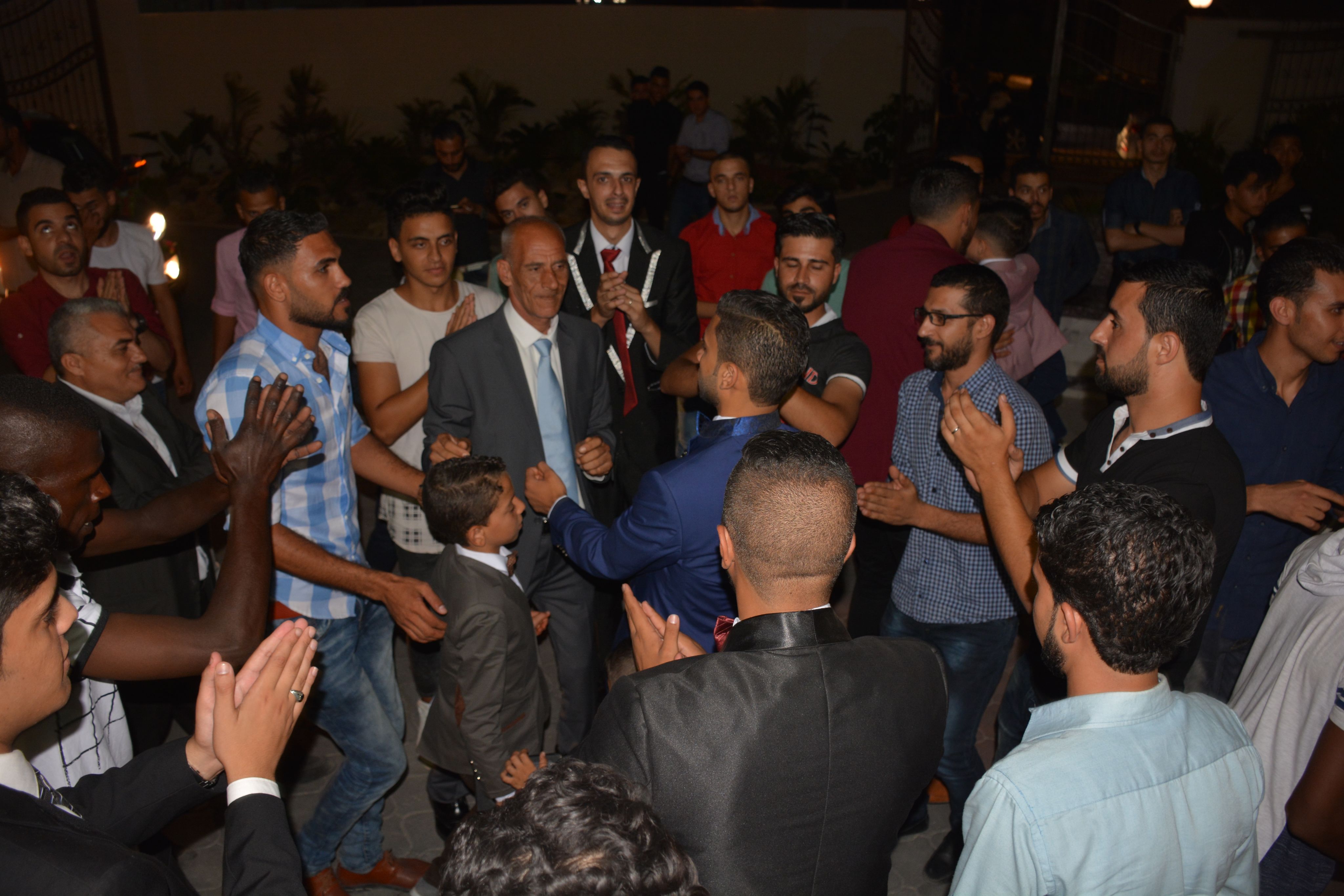
Yousef pictured (in the blue suit in the centre) on his wedding day. Photo: Private
Yousef pictured (in the blue suit in the centre) on his wedding day. Photo: Private
“But Manal became pregnant, and we had Eliaa,” says Yousef.
He smiles and continues:
“My daughter has her own room. It means a lot to me to be able to give that to her. My father became unemployed at a young age, and we were poor when I was growing up. I want my children to have a good life. Nothing ‘fancy’, but a normal middle-class life.
“I didn’t have ‘my own room’ until I got married. I will never forget that feeling when, before Manal and I moved in, I stopped by our apartment and was all alone.”
He taps his index finger on the table as he says:
“A-L-O-N-E. For the first time, I had something of my own. It was amazing.”
Then his expression becomes almost stern, and he says:
“But even though Eliaa has her own room, both she and Ahmad sleep with us. We must stay together. Because at night, anything can happen.”
Yousef being interviewed by CNN in the aftermath of the attacks in May 2021.
NRC supports refugees and displaced people in over 30 countries around the world. Support our work today.
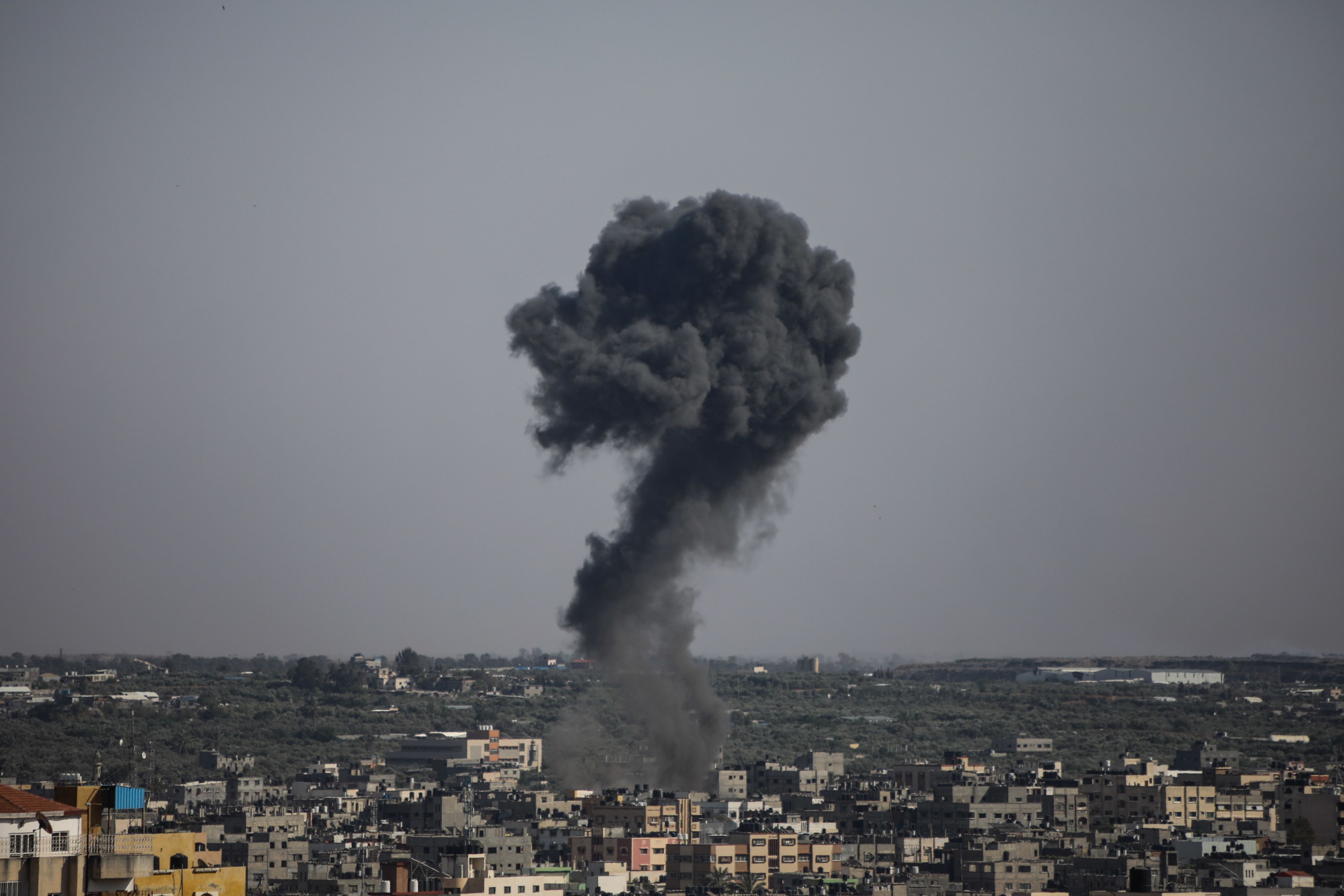
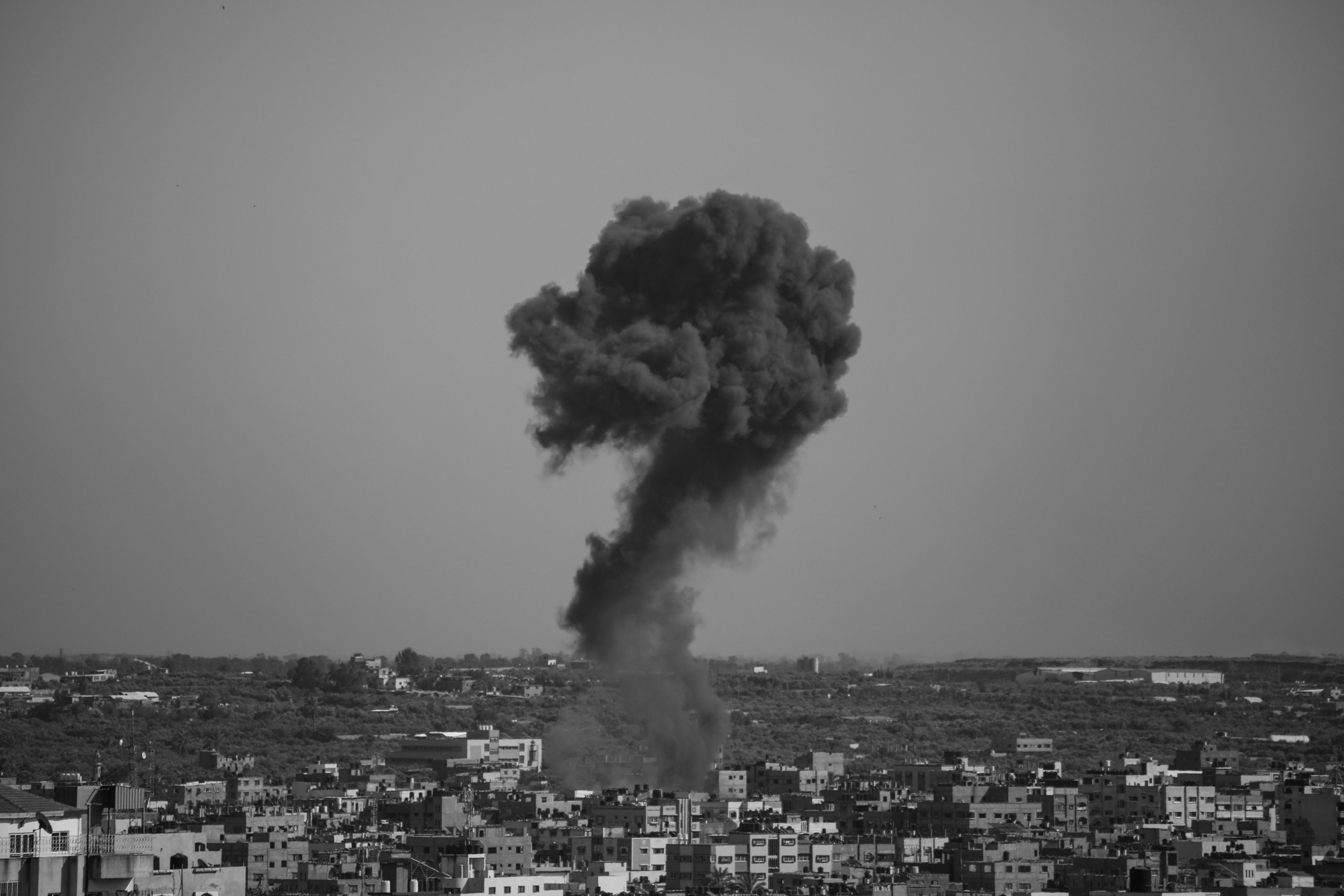
The escalation of violence in May 2021
Aerial and naval strikes on Gaza by the Israeli military, along with shelling, started on 10 May. They were prompted by rocket attacks towards Israel by Palestinian armed groups, after weeks of simmering tensions in Jerusalem.
Early in the morning of that day, Israeli police stormed Al-Aqsa Mosque in the heart of Jerusalem’s Old City, on the compound known to Muslims as the Noble Sanctuary and to Jews as the Temple Mount. The confrontation resulted in injuries to hundreds of Palestinians and several police officers. It coincided with Israel’s celebration of “Jerusalem Day”, marking its capture of East Jerusalem in the 1967 Arab-Israeli war.
Throughout the holy month of Ramadan, Israeli forces clashed with Palestinian protesters in and around Jerusalem’s Old City. At the same time, peaceful protests by Palestinian families facing expulsion from their homes in the East Jerusalem neighbourhood of Sheikh Jarrah turned into daily skirmishes with Israeli settlers and police.
Groups of Israeli settlers attacked Palestinians in Sheikh Jarrah and elsewhere in Jerusalem, at times using live ammunition. Israeli forces employed a heavy hand to disperse Palestinian crowds, using stun grenades, tear gas, rubber-coated metal bullets, and “skunk” water (a foul-smelling, non-lethal liquid sprayed by vehicles equipped with water cannons).
Palestinian and Israeli children always pay the highest price during these episodes of violence, which not only leave physical scars, but also mental ones.
These tensions over East Jerusalem served as the catalyst for 11 days of intense hostilities between Israel and Palestinian armed groups in Gaza, unrest across the West Bank, and a wave of street violence across the country between Jews and Palestinian citizens of Israel.
More than 260 people in Gaza, including 66 children, were killed during the escalation, according to the Office of the UN High Commissioner for Human Rights (OHCHR). A further 27 Palestinians, including four children, died in the West Bank. In Israel, 13 civilians, including two children, were killed.
Israel and Hamas entered into a ceasefire on 21 May, but flare-ups continued throughout the summer along Israel’s perimeter fence with Gaza.
No guarantees of anything
Gaza is a narrow, 365 km2 strip of land on the east coast of the Mediterranean. It only takes an hour to drive from one end to the other.
“I don’t think it is easy for people on the outside to understand what it’s like to live here. There are no guarantees here. Not for life. Not for work. Not for anything. You can become poor in a heartbeat. Or you can die,” says Yousef.

Map displaying Gaza
He is one of the 2.1 million people living in the Gaza Strip. The majority, about 1.4 million, are Palestinian refugees from the Arab-Israeli war in 1948, and their descendants. Such as Yousef.
The United Nations Relief and Works Agency for Palestine Refugees in the Near East (UNRWA) says that years of conflict, recurrent hostilities and siege have led to more than 80 per cent of the population being dependent on international humanitarian aid.
In his 29-year life, Yousef has experienced hostilities in Gaza in 2007, late 2008 through early 2009, and 2014. But he thinks the bombing during those 11 days in May 2021 was the worst.

Map displaying Gaza
Map displaying Gaza
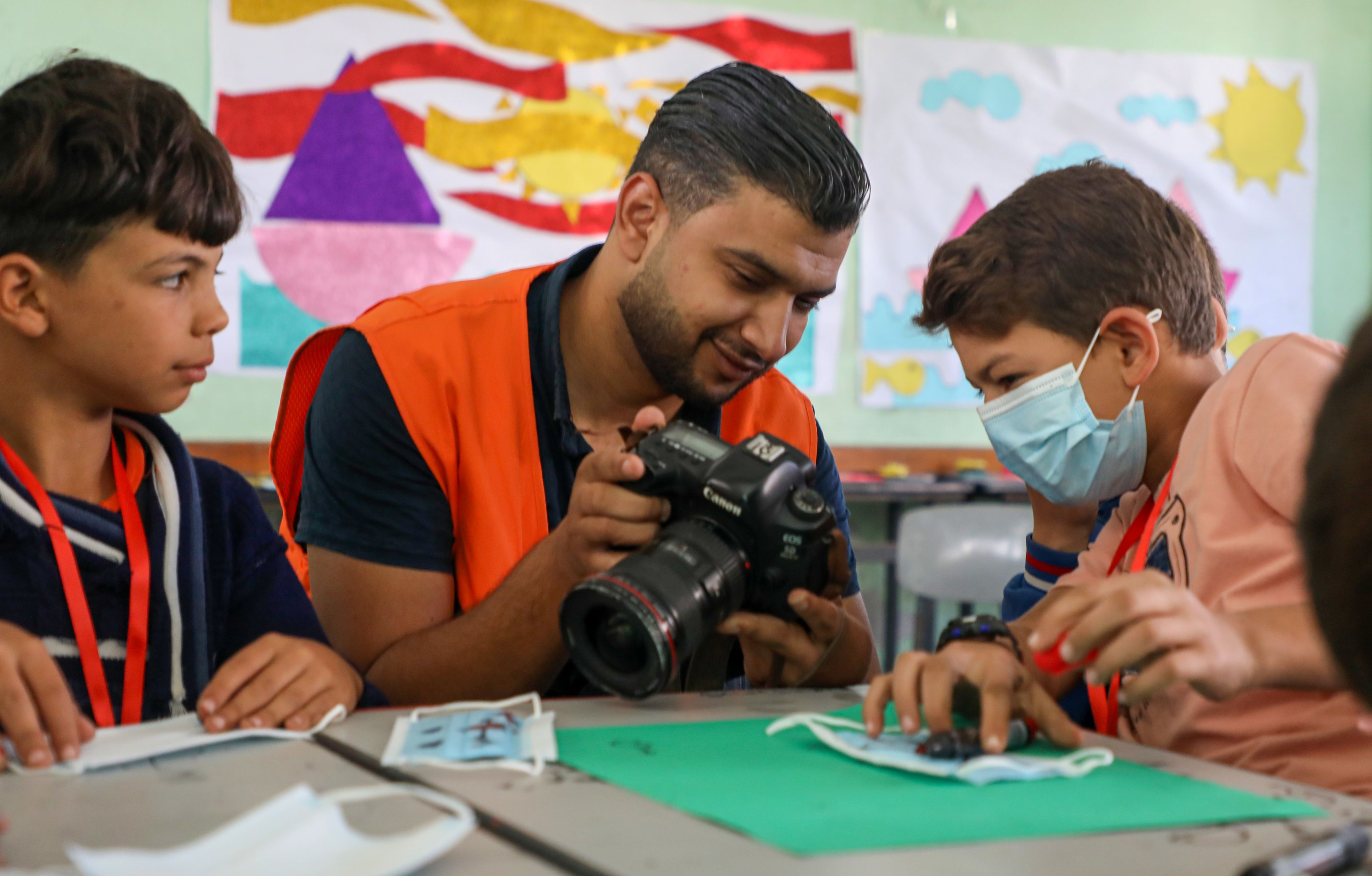
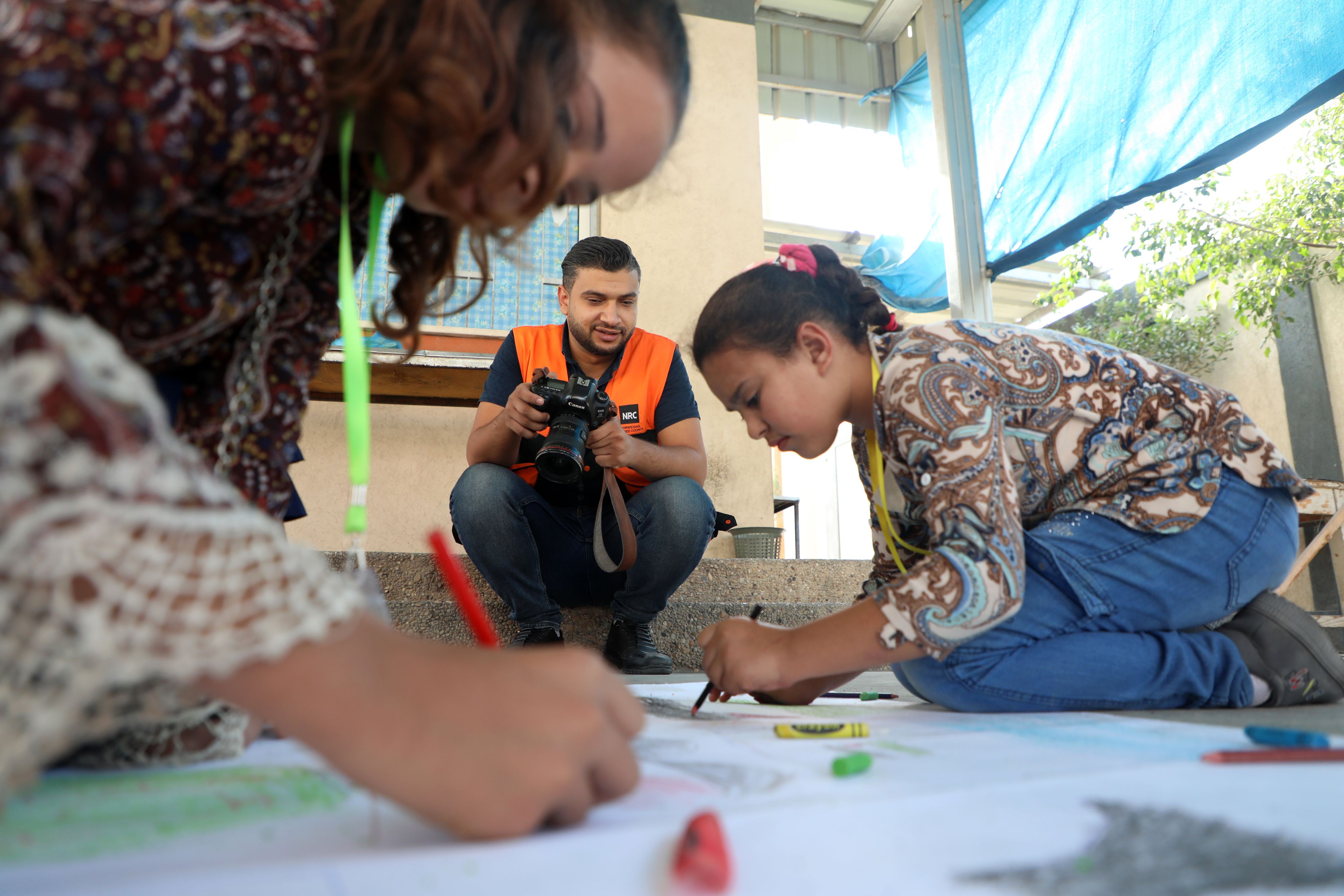
Afraid of the night
Yousef has never been the anxious type. As a freelance journalist, he sought out fighting and unrest in Gaza for several years and provided video footage to major international media companies. Today, he works with communication and advocacy for NRC, which has around 50 employees in the Gaza Strip.
But he has changed – he has become scared. The change came when he became a father. Yousef is terrified that something will happen to his children. The bombs fall at night, and he has become afraid of the night.
He says:
“Someone wrote on Facebook: ‘Two million people in the Gaza Strip hate the night.’
“Now I’ve become one of them.”
The Washington Post
On 21 May 2021, The Washington Post, through the newspaper’s bureau chief in Berlin, Loveday Morris, published a lengthy interview with Yousef Hammash in which he recounts his experiences during the Gaza hostilities.
The newspaper also published his videos. Throughout this article, we quote (in grey italics) extracts from the interview.
On Tuesday, the first day, I was at my house, about to take a shower. I was preparing to go to my parents’ house; it was Ramadan, and usually we have iftar together. My wife is eight months pregnant. My daughter is three. It was 6 pm. They attacked my neighbor’s house. I still have a headache now from the sound of that missile. Everyone was running; everyone was screaming. We just wanted to run; usually, one rocket is a warning. At that moment, I was terrified. I started to film what had happened there. Then they attacked with the second rocket.
I moved to my parents’ house, I stayed there all night. It was a very, very heavy attack behind the house. It was like 30 airstrikes in one minute. I collected them [my family] all in the corridor in the middle of the house. I was screaming, asking them to stay on the ground, to stay down because we didn’t know where the bombing was. It was a really crazy night.
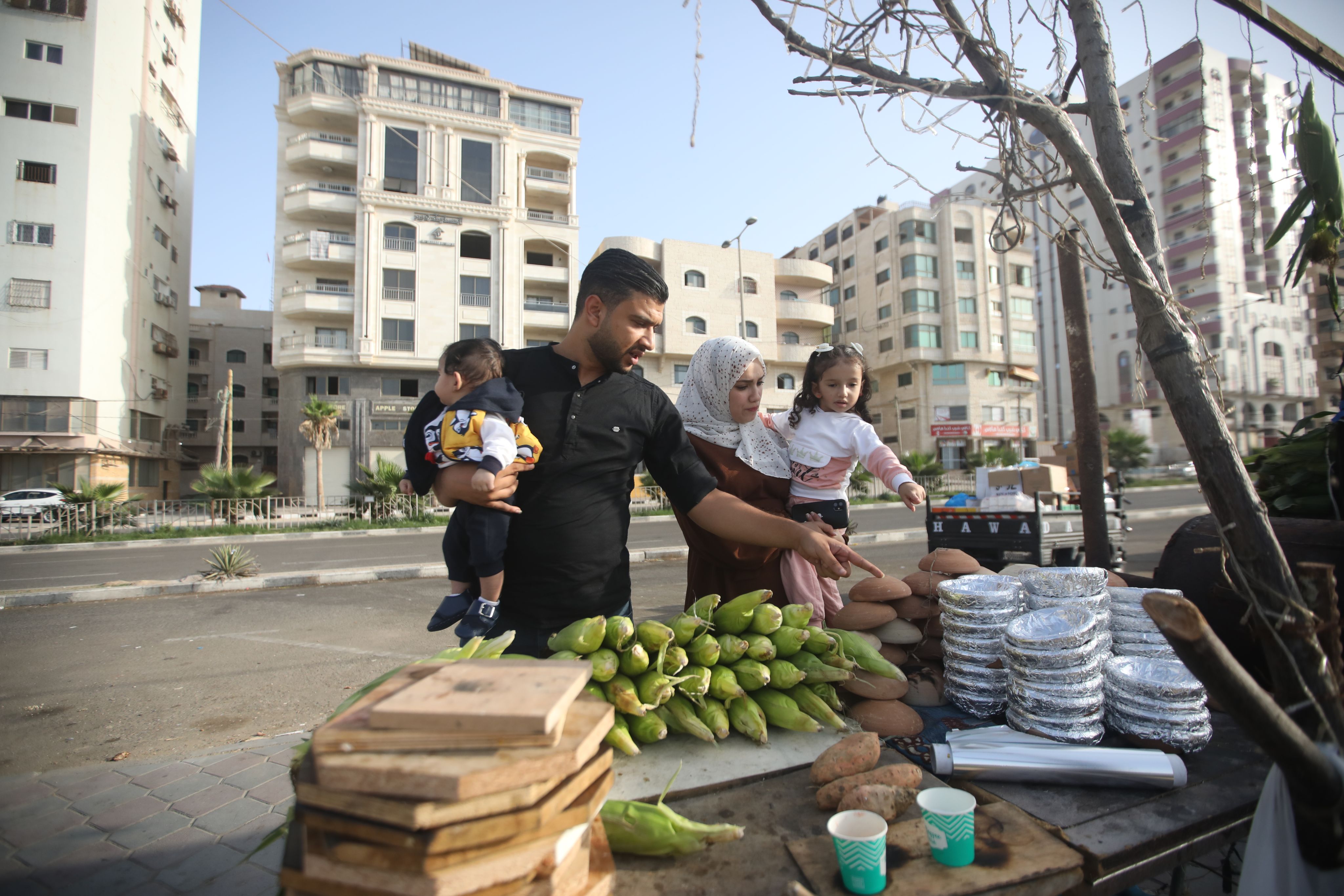
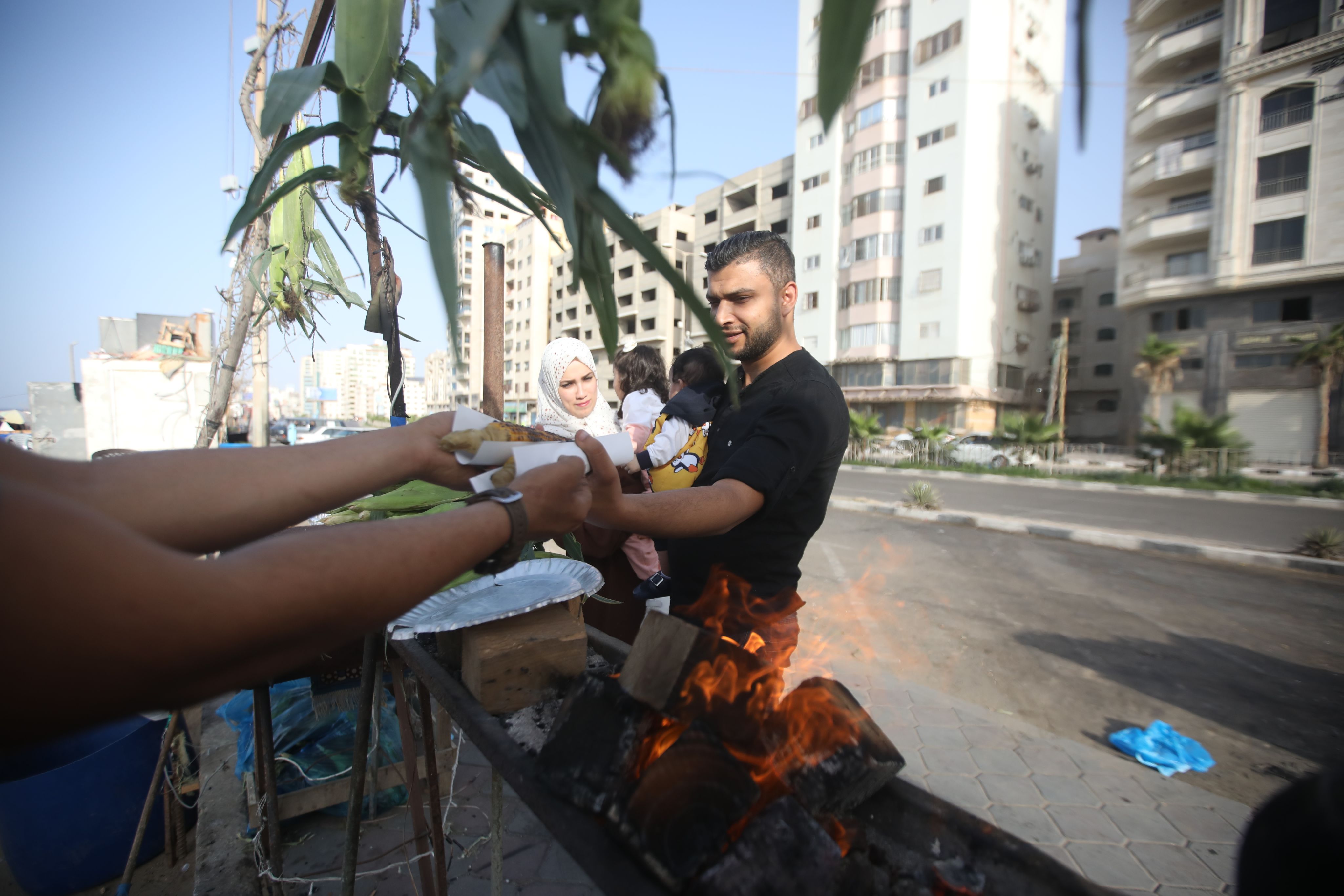
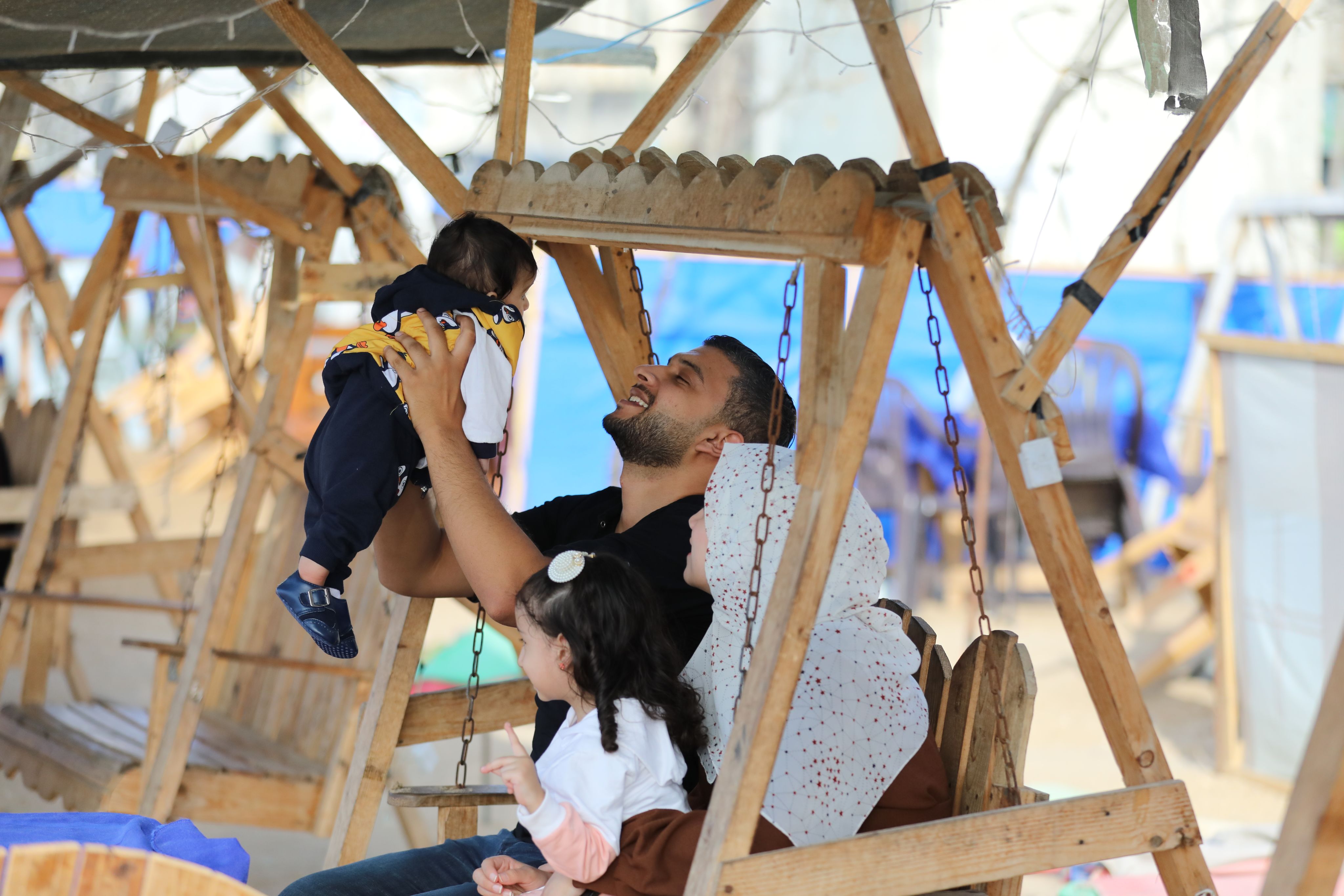
Gaza: like waiting for a tidal wave
Gaza has been completely cut off from the outside world for extended periods. Israel’s siege on Gaza, with Egypt’s support, has entered its 14th year, causing great suffering to the civilian population.
In addition, unemployment is sky-high – estimated at 50 per cent.
Yousef explains:
“Gaza has one of the world’s most highly educated societies. But even if you have a doctorate, it’s hard to find a job. Most people have to make do with odd jobs. It’s quite common for an engineer to take a temporary job in a café, for example.
“When Israel introduced the blockade in 2007, we ran out of most things. Such as electricity and petrol. But people from Gaza are smart, we find solutions. When we no longer had gasoline, we started using cooking oil as fuel instead. That’s how we have managed, year after year.
“We have a very high suicide rate. Every week there are people who take their lives. Like one of my cousins.
“Life in Gaza is not normal. It’s like waiting for a tidal wave. Every day, every hour, every five minutes, every second, every moment, everything can suddenly change. Collapse. It can be peaceful for a long time, but we notice when tensions escalate. We can nearly always tell when the situation is about to explode. We can feel that it will happen in a few days or next week. This is our daily life.”
Two million war stories
Yousef continues:
“We face an escalation of the conflict on a daily basis, such as the Great March of Return. [Protests launched in 2018 in which Palestinian residents of Gaza demanded an end to the siege and to be able to return to their lands where the state of Israel was established in 1948.]
“There is not a single family in Gaza that has not lost a child or a family member during an escalation of the conflict. I myself have two cousins who were killed. My brother was injured. Our house was badly damaged. And that’s just my story. Then you also have the stories of two million others in Gaza.
“The problem for the young people here is that we are so aware of the situation. We understand that there is no hope that there will ever be a solution to this.”
Footage that a friend of Yousef filmed the day Eliaa was born.
NRC supports refugees and displaced people in over 30 countries around the world. Support our work today.
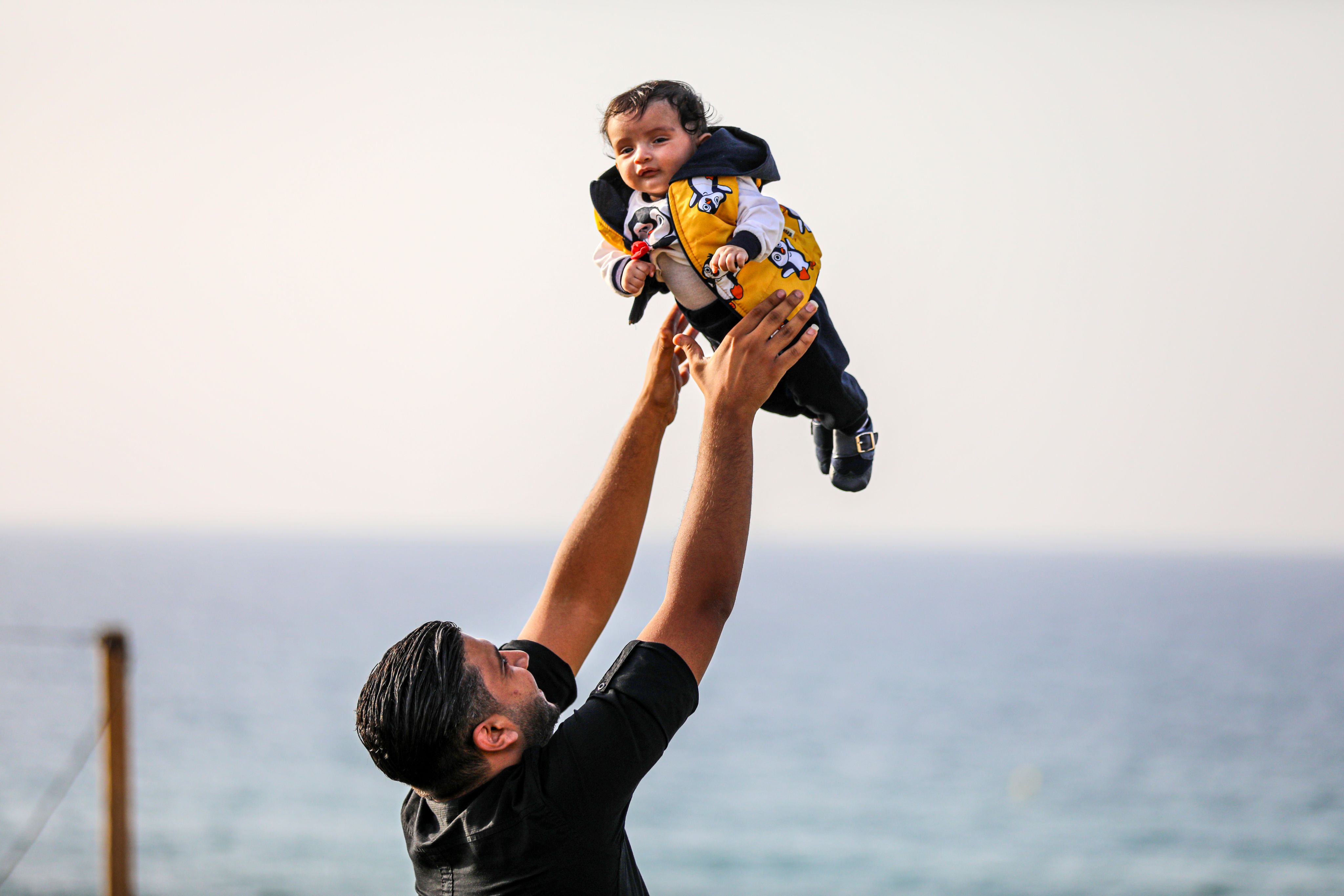

Never seen the outside world
“People who left Gaza in 2007 are now in their 30s and 40s. The generation before us could travel to Egypt or Israel to study. But not my generation.
“I’ve never been outside Gaza. Although I have made a lot of documentaries from Gaza and I am in daily contact with media and film people all over the world, I have never been outside Gaza.
“For example, I have never seen a train in my entire life.
“I want to see everything I see on YouTube in real life. I want to experience walking in streets where I don’t have to be afraid. It’s normal to want to see the world.
“But for us, it’s just a dream.
“Nothing can justify that.”
Footage of Gaza from above.
Footage of Gaza from above.
The next day, I went back to my apartment to take some clothes for my wife because I decided to send my wife and daughter to her parents’ house. I was feeling it was safer for them to stay at my father-in-law’s house. There aren’t high buildings, and it’s a two-floor house, no neighbors. For my parents, I’m the only man for them, so I thought I should stay.
I’d just entered the house, just for a first few seconds. Most of the windows were broken, and the bedroom was really damaged.
They attacked again. I ran to the window. At that moment, all I was thinking about was running. It damaged the shop nearby; the neighbors were trying to break the door to control the fire. I had to run to my parents’ house. And then we decided that even my parents would flee from there.
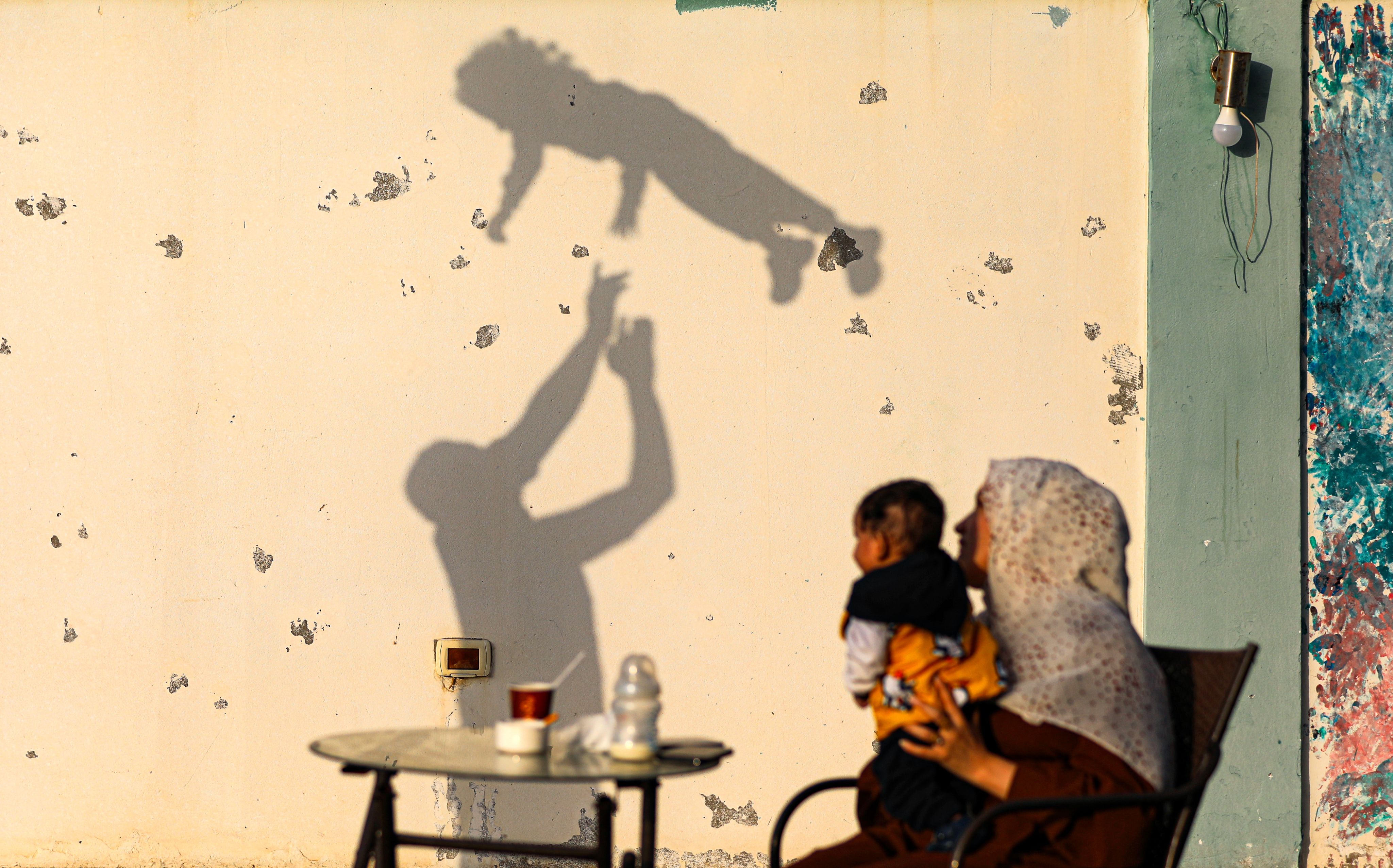
Childhood
Yousef was born in one of Gaza’s refugee camps in 1992.
“I have two brothers and four sisters. I’m the youngest son. We lived in the refugee camp until I was ten or 11 years old.
“My father wove traditional rugs. But the demand declined as people began to buy mass-produced rugs.
“Because we needed money, we had to sell our house. But a house in a refugee camp isn’t worth much. The money was not enough to buy a new home. So we had to rent and moved from house to house.
“We were 13 people in a three-room apartment of 90 square metres. After my sisters got older, I slept on the sofa.
“I decided to drop out of school when I was 13 years old. I wanted to work instead.”
I went with them to my grandparents’ house. Our other relatives had to flee there, so there were a lot of people. The house is two rooms and one [sitting area], and they were containing around 10 to 15 people. Everyone was tense; we understood that no place was safe.
On Friday, I moved to my father-in-law’s house; they were insisting that I come there. The way that my daughter was waiting for me on the stairs to arrive, she’s three years old, but she’s really smart. I was happy but also really terrified, and I was just trying to keep her beside me. Wherever I went, I wanted her around me, her and my wife.
It is impossible for people in Gaza to flee to safety as they cannot leave the Gaza Strip.
Yousef talks about his encounters with the hostilities:
“I was on my way to school; I think I was 12. It was the first time I saw a tank. It was right next to our house. It was exciting. When the hostilities started again in late 2008, it was pure madness, and it lasted for 22 days. I was 15 years old. F16 planes flew right over our heads.
“The first time I saw anyone be killed was in 2009. It was my cousin. It happened right in front of my eyes. Then I felt the feeling of having lost someone I loved.
“It’s the worst feeling.
“It wasn’t as bad in 2012. The airstrikes were mostly in other areas of Gaza. In 2014, I was a journalist, and then there were lots of tanks and massive airstrikes. Over 100 people were killed in one day. A friend of mine was among them.
“For the first time, I also saw people fleeing their homes – in the thousands.
“Being displaced is almost the worst, you can’t help yourself and have to seek help. It makes you feel like you’re losing your dignity. And once you get to safety, you are hit by the trauma. You can’t think of anything other than the terrible things you have experienced.”
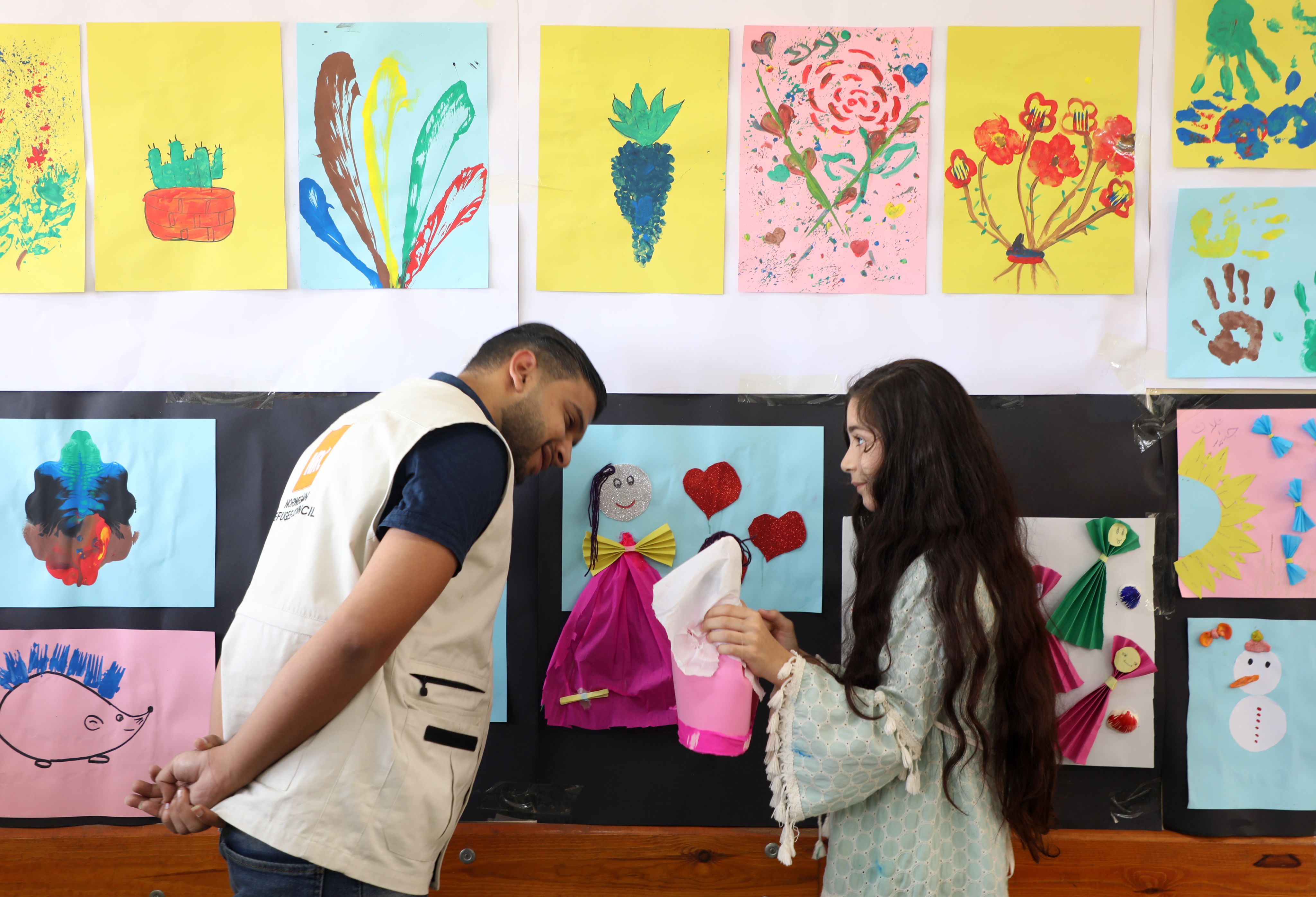

Providing for his extended family
In the years since Yousef left school, he has worked nearly around the clock.
“Being responsible for my family was not just about money for rent, food, medicine, clothes and school. I also had to follow up my sisters at school and support my mother, who has heart problems.
“It hasn’t been easy. But today, two of my sisters have graduated from university. One is studying medicine. The last one is going to upper secondary school,” he says.
First, Yousef got a job in a printing company. When his friends eventually graduated from high school, most of them went to university to take media studies. He joined them and attended the lectures even though he was not enrolled as a student.
He worked as a gopher at a media and production agency, where he learned to use the TV camera from the camera operator. In the office, he had access to a computer and the internet, and that’s how he learnt English.
He got a job as a camera operator and worked with foreign TV teams that came to Gaza. During the 2014 hostilities, he was a freelancer with his own camera.
While working for the Palestinian Centre for Democracy and Conflict Resolution, he started studying school subjects. From time to time, he worked with journalists from foreign media houses such as the UK’s Channel 4 and the BBC.
“Born to live”
About 10 minutes after I met them, they attacked again, near my father-in-law’s house. There was a very loud explosion. My daughter was between my legs playing, and I grabbed her to hug her. It’s a normal reaction – I just wanted to make sure she’s safe. She screamed from my reaction, not the bombing. Then I realized my wife succeeded in convincing her that all of this was fireworks.
We tried to avoid the word “bombing,” qasaf, in Arabic; we’d say “fireworks.” It was heavy shelling all the night, heavy bombing. All of us, even my father-in-law, his wife, we all went inside a room in the back of the house with no windows. We understood that it’s the most safe place…
… I haven’t seen this kind of bombardment. This kind of explosion. The shake of the house. The sound. The massive destruction. The streets have been demolished; there are places in Gaza we can’t recognize. It’s really insane.
Footage that Yousef captured in May.
Yousef thinks for a moment before continuing:
“In Gaza, there is no solution.
“We are under siege. Under blockade. But no-one hears about us. We are second-class people.
“At the same time, some people in Gaza say: ‘We were born to suffer.’ But I say: ‘No! We were born to live.’
“Because it is not the case, as is so often portrayed, that we in Gaza are so strong and able to resist all this time and time again without complaining. That we are made of iron.
“No, we are human beings, too.
“We are scared all the time.
“That is what’s normal.”
Finally able to sleep
I moved back and forth to my parents’ house, trying to work on press for NRC. Working on my laptop, connecting to the Internet. I chose a place that was sheltered by a wall. If there was an attack, I would be injured, but we were reducing the casualty.
I only had one shower in ten days, and it was the fastest shower in my life. I had to take it wearing my clothes, because I was afraid to be bombed when I was naked. I took my shower wearing my underwear. Even my wife was sleeping in her hijab.
I didn’t know what day it was. I just knew I wanted to finish day by day, and if I was still alive from one, go on to the next one. That’s what me and 2 million other people were doing.
When they announced the ceasefire at 2 a.m., a friend called me to go to see the streets: “There are sad faces, there are happy faces, there are fireworks.” To be honest, my answer was, “I want to sleep.” I wanted to sleep without being afraid that there were going to be bombs. All that I did was sleeping. I don’t remember completing one hour of sleep in a day.
NRC speaks to the world
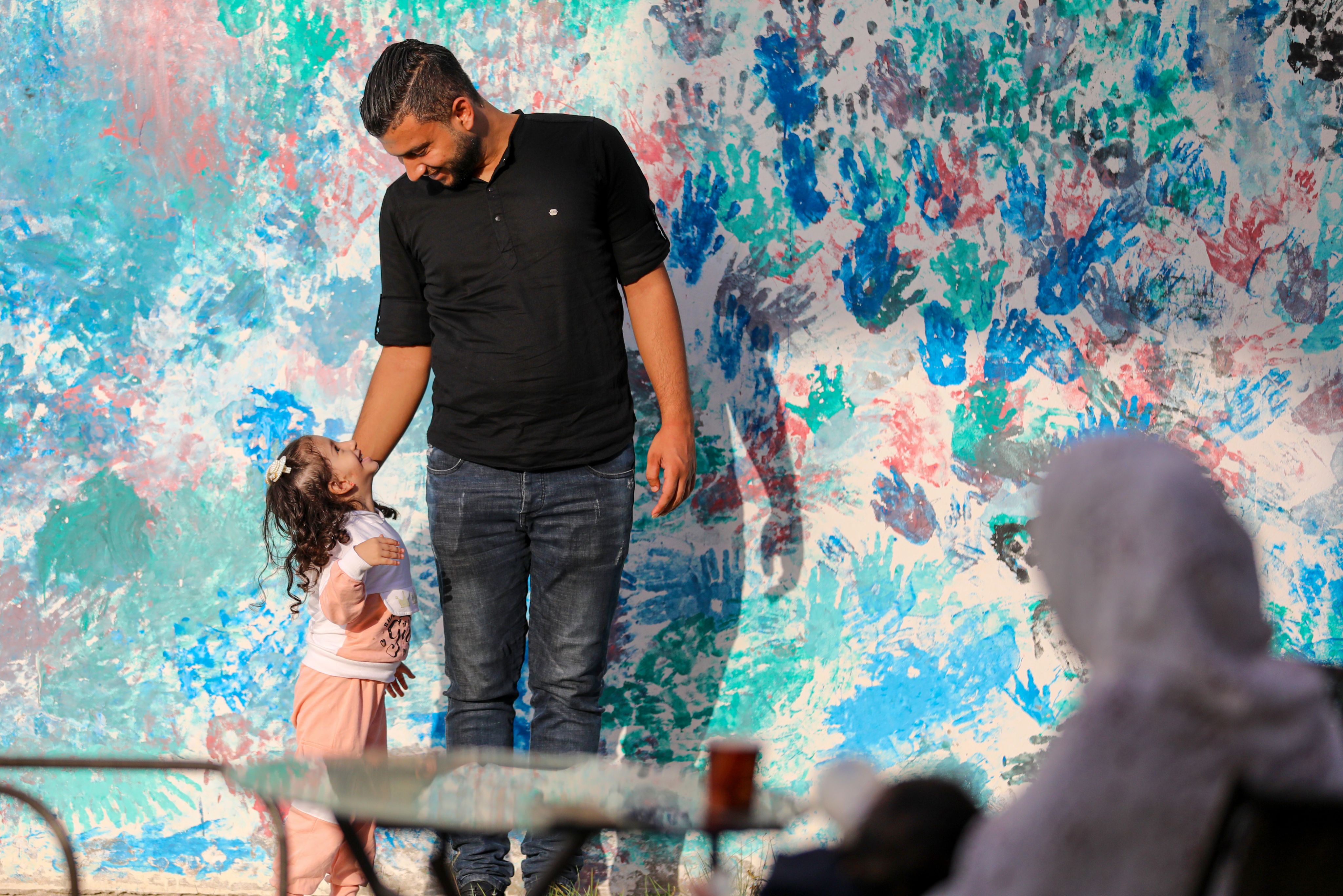
His face is serious:
“The world needs to know what’s going on. I am proud that NRC talks openly and freely about our situation here. We in NRC speak out and demand an end to the blockade. We tell people that they have rights.
“NOBODY spoke about the 12 children who were killed [the children who participated in NRC’s school programme that helps children with conflict-related trauma] in May before NRC did. It wasn’t until we spoke out about it that the international media woke up. But it was we in NRC who made the world aware that this was happening,” says Yousef.
He falls silent.
Then he says:
“Those 12 children were just like my children. They were like my Eliaa and my Ahmad.
“They were born to live.”
2024 update
On 7 October 2023, Palestinian armed groups in Gaza fired a barrage of rockets toward southern Israeli communities. They entered Israeli communities, killing 1,200 people, mostly civilians, and took around 240 hostages. Some of the hostages have now been released in a swap deal.
Israel has since transformed its 16 years of almost complete into a total siege on Gaza and launched the bloodiest offensive against Gaza for years.
Yousef is still working for NRC in Gaza. You can read more about his experiences during this latest escalation here.
NRC is advocating for an urgent and lasting ceasefire in Gaza and Israel, along with an immediate de-escalation of tensions in the West Bank, as an immediate action to save lives and avert a worsening humanitarian catastrophe.
Sources: BBC, nrk.no, Wikipedia, The Great Norwegian Encyclopedia
